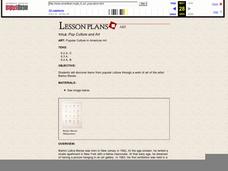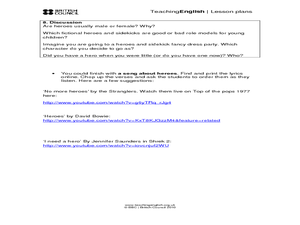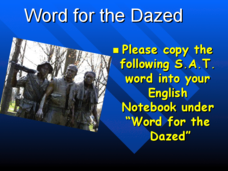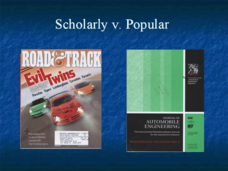Media Smarts
Defining Popular Culture
What part does media play in creating, defining, and perpetuating popular culture? High schoolers chart their encounters with fads, trends, and icons and reflect on the media's influence on popular culture.
Curated OER
Student Opinion: Are You Popular, Quirky or Conformist?
Approach the topic of popularity with this resource from the New York Times and their Learning Network series. The article is about Alexandra Robbins' "Quirk Theory." Learners respond to the article excerpt either on paper or online....
Curated OER
Folk and Popular Culture
Good enough for a college class, this resources discusses multiple aspects pertaining to the issues with globalization and the differences between pop and folk culture. It defines major terminology, provides concrete examples, and...
Curated OER
200 Greatest Pop Culture Icons
Upper graders explore pop culture and pop music as a forum for female role models. They explore women who have currently contributed to our pop world and why they could be considered role models. They each interview a woman in their...
Curated OER
Pop Culture and Art
Learn about American pop culture, art, and the social voice that art can convey. The class discusses the life and art of Barton Benes, views his piece Reliquarium, then discusses what they see and feel when they view his work. Make sure...
Curated OER
Allusions to Shakespeare in Popular Culture
Send your high schoolers on a scavenger hunt through popular culture (music, television, video games, movies) to find allusions to Shakespeare. They must each provide three to share with the class, and the one they present cannot have...
Curated OER
Individuality vs. Conformity
Spark an animated debate in your class! Young adults consider some of the fads or trends that are prevalent at their school, as well as their own level of participation in them. Just how much of a role does popular culture play in their...
Curated OER
The Kansas-Nebraska Act of 1854: Popular Sovereignty and the Political Polarization over Slavery
Why did Stephen Douglas support the Kansas-Nebraska Act of 1854? Why did Abraham Lincoln oppose it? Young historians examine how the Kansas-Nebraska Act of 1854 affected the political balance between free and slave states and explore how...
Curated OER
Explore Literary Devices in Popular Lyrics
Bring literary devices to life by listening to popular song clips and studying their lyrics.
Curated OER
The Sorcerer's Apprentice: 200 Greatest Pop Culture Icons
Upper graders view the animated short, "The Sorcerer's Apprentice" and analyze how the music score was chosen to express the scene. They create an animation as they listen to a classical recording to experience the connection between...
Curated OER
Music and Animation: 200 Greatest Pop Culture Icons
Music has been used to convey thoughts, feelings, and the human condition for thousands of years. Your class will analyze several songs hear in the animated classic, "Charlie Brown." They will listen to several jazz pieces from the show,...
Curated OER
Popular Sovereignty Under the Kansas-Nebraska Act
Seventh graders examine the implications of the Kansas-Nebraska Act. In this slavery lesson, 7th graders examine a map of 1820 America and discuss the balance of power implied by the map. Students then read Stephen Douglas's speech on...
Curated OER
AIDS: A Pop Culture History
Students watch the documentary AIDS: A Pop Culture History and discuss the issues the documentary raises. Students discuss the different facts and myths about AIDS, discuss stereotypes in relation to the disease and discuss common fears...
Curated OER
Heroes and Sidekicks from Popular Culture
Students discuss familiar fictional characters. For this fictional characters lesson students practice pronunciation of adjectives. They describe the personality of popular characters by answering questions about those characters.
Japan Society
Popular Culture and Japan’s Gross National Cool
From Manga to Godzilla and Pokemon, Japanese pop culture has been taking the globe by storm. This phenomenon is called "soft power." Learners will examine the differences between hard and soft power, as well as learn the historical and...
Media Literacy
Good Versus Evil: Exploring Popular Children's Animation
Dora, Buzz Lightyear, Mufasa. Swiper, Dr. Porkchop, Scar. The six lessons in this unit packet focus on how good and evil, and violence, are portrayed in children's animation. The lessons encourage kids to consider how violence is...
Curated OER
Popular Music and Music Videos
This resource is part of a three-activity unit that introduces your class to the concept of popular culture and the role that it plays in their lives. Here, learners examine the importance of the music industry and music videos in pop...
Weebly
Mini-Media Literacy Project
Encourage your pupils to think critically about media and the messages media portrays. Starting off with a quick-write about pop culture, this assignment launches into a hands-on, collaborative collage project. After creating collages,...
Curated OER
Word for the Dazed: SAT Vocabulary
Prep those high schoolers for the S.A.T. by giving them one new word each day. There are 16 wonderful words, each with dictionary definitions and contextual example using a current pop-culture reference. Tip: Extend the daily vocabulary...
Media Smarts
First Person
High schoolers explore the relationship between video games and actual population. Example: A 2005 study showed Latino youth play at higher rates than other groups, but there are no Latino playable characters. They watch a brief video...
Student Handouts
Constitutional Principles
Keep track of constitutional principles with a graphic organizer. Pupils define, describe the origins of, and note down the location of the following terms: checks and balances, federalism, individual rights, limited government, popular...
C-SPAN
2016 Electoral College Map
The electoral college can be confusing for citizens of any age. Clear up misconceptions with a handy printable map that details how many electoral votes are allotted to each state, as well as a history of modern elections, complete with...
Curated OER
Popularity, Publicity, and Public Service
Students discuss the issue of celebritites who speak out for certain diseases. After reading an article, they consider a doctor's perspective on the use of celebrities. In groups, they research a common disease and design a public...
Curated OER
Scholarly v. Popular (Journals)
How do you determine whether a resource is credible or not? Contrary to what your class probably believes, just because it's published doesn't mean it provides accurate information! So how does one determine if it's credible? Use this...
Other popular searches
- Pop Culture
- Pop Culture Lesson
- Popular Culture
- Popular Dance History
- 1950s Pop Culture
- Popular Songs
- Popular Vote
- Popular Sovereignty
- 1960s Pop Culture
- Popular Spanish Culture
- 1980s Pop Culture
- 1990s Pop Culture






